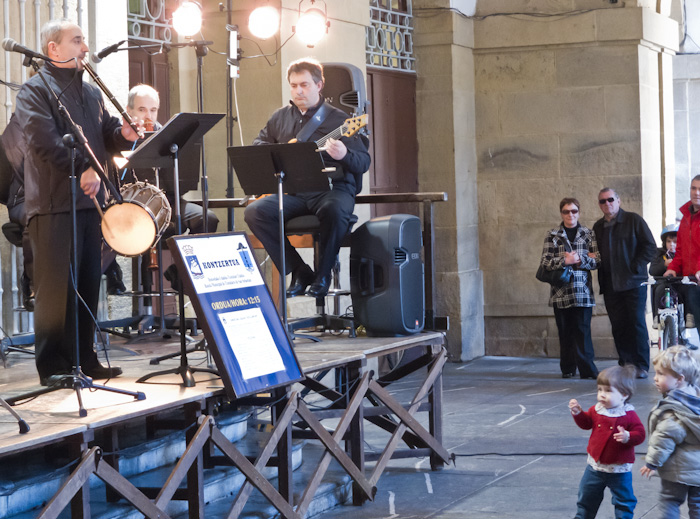
Give Granny A Kiss
by Madeline Ashby

Jack had lived through this same moment before, with human women.
Before meeting his wife (he insisted on referring to her that way, despite their lack of legal standing) at a tech show in Las Vegas, he had spent most of his dating life in what he called the Relationship Academy of the Dramatic Arts. Through a combination of patience, politeness, punctuality, and other qualities curiously absent from most of his competitors, he managed to attract the most volatile women in his available pool. They were the kind who called you in tears at three am, two years after the breakup, when their latest “performative bio-political modification” art project got infected. He offered these women the opportunity to calm down and sort things out. Things their moms had said. Things their dads had never said.
Charlotte was different. Charlotte was vN. She had no hormones to influence her decision-making, no feast-or-famine cycle driving dopamine or serotonin. She didn’t get cramps or headaches or nightmares or hangovers. She didn’t need retail therapy or any other kind. Her “childhood” was difficult – her mother abandoned her in a junkyard – but her spirit was as strong as the titanium sheathing her graphene coral bones, her personal integrity as impermeable as the silicone coating the polymer-doped memristors in her skin, her wit as quick as the aerogel currents wafting through the musculature of her body.
Charlotte was a self-replicating humanoid. Charlotte didn’t do drama. Until now.
That morning he’d found Charlotte in the same place he’d found her all week, curled up beside Amy in the hammock their daughter used for defragging. Their faces echoed each other: heart-shaped, with narrow little elfin chins and high cheekbones, delicate ears, couture eyebrows just as fair as the hair on their scalps. Depending on how much and how often they fed her, Amy would eventually grow to her clade’s default size and shape. At that point, she and Charlotte would be indistinguishable. Jack worried about that, sometimes. What if one day, years from now, he kissed the wrong one as she walked through the door?
For the past month, Jack had gone to bed alone. He only felt Charlotte slip in beside him in the dimmest hours of the morning. He always rolled over to hold her for the last few seconds before her body went completely still, untroubled by snores or twitches. That perfect stillness took some getting used to. At first, it felt like holding a corpse. Now he suspected he’d find human women too warm, too loud, too mobile.
When he’d asked last week, Amy said her mother spent most of her time looking up potential clademates online and mapping their locations. She had shared access to the map with Amy, but not Jack. The clusters glowed throughout the American southwest. The Border Patrol sometimes found them helping migrants across the desert. It was the failsafe, Amy said. They had to help, even when helping was illegal. With a flick of her wrist, she and the projector had put him down inside the canyons where the sightings took place, walking him down the blazing paths his wife had traversed only hours earlier. Amy had snagged the images from drones the Border Patrol shared with the public, but confessed to having already played them in an epic weekend game of Capture the Frag.
“You’re not supposed to play violent games,” he’d said. “They could trigger you.”
Amy ignored him and changed the subject. “Mom’s been away from her mom and her sisters so long, she doesn’t know how big the clade is. They don’t even know she’s replicated.”
“Iterated,” Jack corrected her.
Amy shrugged her mother’s shrug. Then she asked: “Dad, what’s an r-selector?”
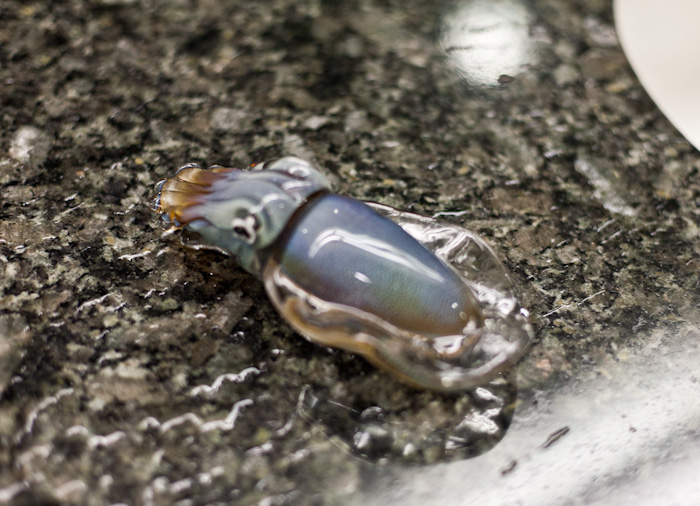
Like most mixed families, Jack and Charlotte and Amy kept their kitchen carefully organized. Although the labelling had improved in recent years, it was still easy to mistake vN food for human food, especially since all the brands now seemed to manufacture the equivalent of their most popular products for vN. The majority of the pantry was dominated by whatever vN food they’d managed to find on special at the handful of retailers licensed to sell it. Jack had gone on a spree, when he realized Charlotte was iterating. Now he realized that they really didn’t need that closet full of vN products, not while they were keeping Amy little. Were it not very illegal, and were it not for the trackers embedded in each box, he might have considered re-selling the merchandise.
Five years ago, Jack had been tempted to speed Amy’s progress and get to the fun parts: theme parks, concerts, bikes. He bought all the food to start that process. But now he knew what life with vN was really like, and he knew his daughter. She needed the time to grow at an organic pace. She needed to understand how she was different and why and what it meant, from her lack of physical pain to her abundance of opinion. She needed trips to museums and street markets; she needed to ask about glistening roasted ducks hanging in windows and why there weren’t any for vN; she needed to build her endless succession of dream homes and secret lairs and impregnable fortresses, each more elaborate and clever than the last, in her multiple gaming environments. This time – this sweet time, pulsing with rhythms he was finally learning after years of moving too fast – was the gift most vN never received. He was determined that Amy have better – even if it meant adhering to a strict child-sized version of the Ro-bento Rory diet, even if it meant telling his little girl to go without meals.
“She stayed up, last night.”
Jack turned. Charlotte knotted the belt of her pale blue bathrobe and pulled out a barstool from the kitchen island. He watched her take note of the box of vN pancake mix he’d pulled down from its shelf, and the spray-can of special oil he needed to cook them with. Her eyes didn’t lift from the products. “So you don’t have go to all this trouble,” she continued, “because she won’t wake up for a while.”
Jack persisted with his preparations anyway. He opened the box of pancake mix, nose wrinkling at the dried-blood smell of the rusty orange powder that puffed up when he ripped open the liner bag. “How late was she up?”
“Midnight.”
Jack nodded. “Did she finish the ship?”
“Oh, she’s never really finished with anything. You know that.”
Charlotte continued staring at the box of pancake mix. Her gaze didn’t move when Jack began measuring the powder into a bowl. She blinked at the proper intervals to simulate a human need for moisture, but her expression – default neutral – remained unchanged. Sighing, Jack retrieved a black tub of ionic gel from the refrigerator door, and set it beside the mixing bowl. He wouldn’t open and emulsify the spoonful required by the recipe until Amy woke up, but he felt better just having it ready on the counter. He liked the integration of old and new in this kitchen – his humanoid daughter’s advanced nano-particle meal formula sitting at home beside the chipped earthenware bowl and the scarred bamboo butcher block. He liked the life those things indicated. He wanted to keep that life.
“You’ve slept with her every night this week, Charlie.”
He watched his wife’s internal protocols negotiate for which expression to summon. Her face vacillated between embarrassed and indignant before settling again on neutral. “Amy can’t play with human children. She needs a vN friend.”
“I agree, but I need my wife, too.”
Now Charlotte’s eyes rose. “Is this some kind of test? Do you think that my feelings for you aren’t genuine?”
Shit. Now he’d done it. He’d committed the one sin that no human partner of a vN humanoid should ever contemplate: he had doubted the reality of Charlotte’s emotions. How many times had he unwittingly made that same mistake? Shame prickled across his skin. No wonder Charlotte was acting strangely.
“Charlie, that’s not it-”
“You think I really am just a robot-”
A chirp from Amy’s wrist-mounted design assistant interrupted her. Their daughter stood in the doorway, wrist held up in its habitual composition pose, perhaps articulating the bend of a banister or an arcade. Her hand dropped abruptly and she turned back down the hall. Her footed pyjamas made scuffing noises as she marched away. Jack dropped his measuring cup immediately and went after her. He caught her door on its track before it could click shut.
Amy’s room was made to look like the interior of a treehouse. The knotty pine had cost them but it was worth it, and the sheer number of nails meant that she never really lost anything because she could always hang it in plain view. She stood at her pegboard now, carefully re-organizing her shirts by colour. Her projector remained locked in display mode. The light from the projector hid her from him, a little, and when he moved she moved, too, obscuring herself in the brilliance of last night’s creation: an eighteenth-century pirate cruiser called The Sun Queen. He watched its walls peel away to expose the decks hidden within, and all the mates inside swabbing floors and tying down barrels and playing dice.
“How much did you hear?” Jack asked.
Amy shrugged.
“I was making pancakes.” Jack tried to smile, just in case she turned around to see it. “I should know by now not to start a conversation with your mom before having any coffee. It’s an organic thing, you know?”
Amy nodded. She must have heard this excuse any number of times, from any number of humans. He certainly offered it enough.
“This is a really cool ship, you know. You did a great job.”

For a synthetic child, appeals to Amy’s ego still worked fairly well. This time she did turn around. She twisted her wrist, and the display vanished. “Mom thought she saw one of her sisters last weekend,” she said. “That’s why she’s being weird.”
Jack nodded. He looked around for a cushion large enough to hold an adult, and sank into it. Amy joined him in his lap. “Mom says our shell used to be popular.”
“That’s true,” Jack said. “That’s why she gets confused, sometimes. There are so many vN with your face running around, it’s easy to make a mistake about seeing a clademate.”
Amy nodded into his chest. “That’s what she said, too.” She fiddled with her assistant, sliding two fingers under the fabbed bangle and wiggling them. “She said I’m not supposed to talk to them.”
“You’re not supposed to talk to any strangers, no matter who they look like.”
Jack kept his voice light. No need to teach Amy his phobias. He knew other parents feared the same things: strangers, vans, promises of puppies. In their darkest moments they imagined their children kicking and screaming, wrestling against duct tape or blankets. What terrified Jack was the willingness with which Amy would allow herself to be taken by whatever human pervert came along. Her failsafe guaranteed that.
The angel investor supporting the development of von Neumann-type humanoids was not a military contractor, or a tech firm, or even a design giant. It was a church. A global mega-church named New Eden Ministries, Inc. that believed firmly that the Rapture was coming any minute now. It collected donations, bought real estate, and put the proceeds into programmable matter, natural language processing, and affect detection – all for the benefit of the few pitiful humans regrettably left behind to deal with God’s wrath. They would need companions, after all. Helpmeets. And those helpmeets couldn’t ever hurt humans. That was the Horsemen’s job.
It all went to hell, of course. The pastor of New Eden Ministries, Jonah LeMarque, and many of his council members became the defendants in a class action suit brought by youth group members regarding the use of their bodies as models in a pornographic game. The church sold the licenses to vN-related patents to finance the settlement. The patents had risen in value over the years that Pastor LeMarque spent in the appeals process. Before entering prison for multiple counts of perjury and obstruction of justice, LeMarque insisted on keeping the failsafe patent proprietary. He claimed that this way, the vN could never be used to hurt human beings. The judge who sentenced him was the first to remark on the irony of this particular opinion.
“How come Mom has sisters, but I don’t?”
Jack blinked himself out of his thoughts. He kissed the top of Amy’s head. “Because your mom and I got it right our first try, sweet pea. We don’t need anybody else but you.” He pulled back a little to peer at her. “Would you like to have a sister?”
Amy twisted her assistant around her wrist. “I don’t know.” She furrowed her pale brows at him. “She’d be just like me?”
“She’d look just like you. That doesn’t mean she’d be just like you.”
Amy nodded. “Would you keep her little, or would you feed her a lot so she caught up to me?”
Jack considered how to re-frame his daughter’s question. “Well, I guess she would grow at a human pace, just like you.” He smiled. “Would you like a little baby to help take care of?”
Amy looked genuinely perplexed. Then her face resolved into mock accusation. “Aren’t you late for work, Dad?”
He laughed. “I’m taking the day off work.”
Amy perked up immediately. She twisted in his lap to face him fully. “Oh yeah? Can I take the day off school?”
He lifted her in his arms and stood. “What? You can’t take today off school; you’ll miss your party!”
Amy rolled her eyes. “The party’s going to be stupid. I bet they forget that I can’t eat the cookies, like last time.”
“Then you’ll need your breakfast, won’t you?”
Jack turned. Charlotte stood in the door, armed with a wooden spoon still glittering with ionic gel. “Pancakes are ready,” she said.
Amy slid out of his arms, briefly threw her arms around her mother, and bounded off to the kitchen. Jack heard the clatter of cutlery a moment later. His eyes locked with Charlotte’s and he opened his arms. Pursing her lips, she stepped inside them. Seven years later, her body still felt the same. Engineers and artists and experts of all sorts had worked to sculpt this form for human use, but Charlotte still felt uniquely fitted to him when she let him hold her like this.
“Are we okay?” he asked now.
She nodded. “Sure.” She pulled away to look at him. “You’re taking the day off work?”
“I decided my girls needed me more, today.”
Charlotte smiled. “Thank you.” Her head tilted. “Do you believe that I love you, Jack?”
Jack’s eyes shut. He tugged her back to him, so he felt the brush of her eyelashes on his neck. Marriages like his operated on a different kind of faith. It wasn’t the synthetics themselves that organics like him had to trust, but the emergent properties latent within them, the sum total of decades of research and design and prototyping. You had to know, deep down, that the expression of feeling was as valid as the chemicals that made all human feeling possible, that the story you read on your wife’s mass production face was just as mysterious and meaningful as the ones gleaned from more wrinkled texts. Five years ago he had sworn by those words or something like them, not legally, but he had wept and so had she and that was all he needed to know.
“Yes. I believe.”
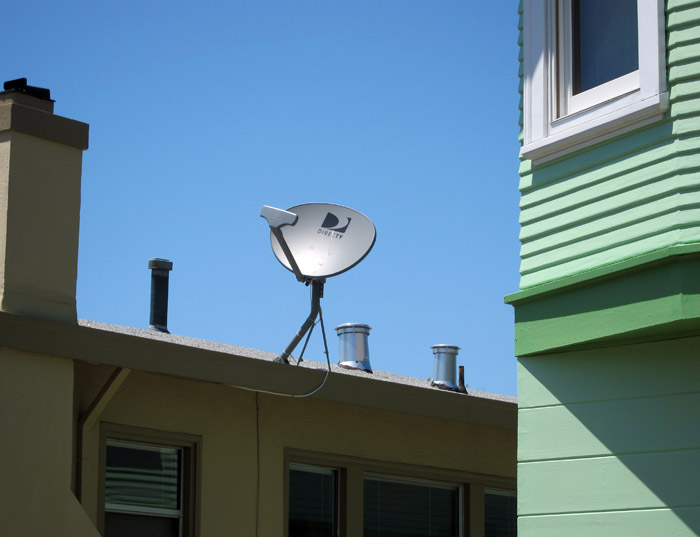
His wife rarely spoke of her childhood, but Jack knew it involved a lot of hiding during the day and raiding junkyards at night. Her mother Portia had iterated her in a junkyard. It was one of the only places with enough raw materials available to trigger the self-repair mode into total self-replication. Charlotte was a glitch; because her clade did not stem from a networked model, neither she nor her mother had access to the clouds that might have regulated their iterative cycles. Now fully grown and far away from her mother, Charlotte craved both open space and solitude. Too many people made her nervous, but too tight an enclosure did the same. So on their dates, he often took her to Lake Temescal.
The first time he brought her here, she asked: “You’re taking an artificial woman to an artificial lake?”
“It wasn’t always artificial,” he had said. “We pitiful humans just improved it a little, with our primitive damming technologies.”
On that day, just like this one, Charlotte luxuriated in the sun. (Sunscreen had fast become the default accessory to their relationship.) She loved the night sky just as much, even during the peak power seasons when it glowed orange with light pollution. She loved hiding in fog and reaching out for the rain from the roof of their building. She couldn’t fathom Amy’s constant desire to stay inside working on environments that would never exist when there was so much outside, waiting to be explored. They fought about it, sometimes, in a completely logical and amicable vN way that nonetheless resulted in stalemates.
Despite the impulsive nature of his decision, Jack had chosen exactly the right day to take off. Clear sky, no bugs save the botflies keeping an eye on the tourists, the clammy fog of winter a distant memory. Others had gotten the same idea: milling around under the shade trees behind Jack and Charlotte was a group of high school seniors attempting to grill a brunch of maple sausage and English muffins on a barbecue with a mostly empty solar cell. It involved a lot of snide laughter and cursing.
The beach was also populated by other vN, both vagrants and min-wage workers standing patiently inside snack stalls. He could pick out the vagrants by the lumps under their skin; unlike the vN with enough money to buy the pre-fabbed food, they often resorted to consuming e-waste to survive. He watched one with a rather bland squared-jawed, broad-shouldered shell seated at a picnic table, picking errant pieces of plastic from its skin and saving them carefully in a colourful pile between his legs. Jack watched him scoop the pieces into his palm and transfer them to a zippered pouch inside his shirt. He would probably feed them to depository later and earn some cash.
“It’s good they have those machines, now.” Jack glanced over to find that Charlotte was looking at the vagrant vN as well. She closed her eyes for a moment, then turned away to hug her knees. “We used to have to actually ask for the money, sometimes.”
“We?”
Charlotte shrugged. “Just vN in general.”
Jack nodded. “If it’s still this nice tonight, I was thinking we’d take Amy to Lake Merritt after the graduation.”
Charlotte winced. “With all the quake tourists?”
“It’s either that or the zoo.”
“I can’t stand the-”
“Fuck!”
Jack twisted to look at the group of teens. A boy wearing a Raiders jersey staggered away from a picnic table beside the grill clutching his hand. A cheap-looking knife and a half-skinned pineapple stood abandoned on the table, and when the kid turned Jack saw blood. He checked: Charlotte kept her eyes pinned to the grains of sand welling up between her toes, where she wouldn’t see the injury or the pain it had inflicted; the vagrant vN hunched at his own picnic table, head hidden in his arms; the vN at the snack counter had shut their eyes.
“I’ll see how bad it is,” Jack said, and pushed himself up off the beach.
“I could help,” Charlotte said. “My clade has a healthcare plug-in.”
“Yeah, a deactivated healthcare plug-in,” Jack said. “No wife of mine is shorting out because some kid can’t use a knife.”
He jogged over to the kids at the grill. They had it mostly covered; the kid with the cut hand had immersed it in a cooler full of ice while his friends rifled their bags for skin glue. Botflies hovered over the kid; one settled on his shoulder and blinked greenly at him before alighting on the cooler itself. The kid held up his hand, pink now with diluted blood, and the fly blinked again.
“You okay?” Jack asked.
The kid turned. “I think so.” He held out his hand. “Does it look bad?”
Jack looked. The kid had sliced into his fingers pretty deep; probably deep enough to chatter a doctor about it, but the glue would do the job in the meantime. “You’re fine,” he said. “Next time, slice the bottom off the pineapple before you trim the sides. That way you’ll have a stable base.”
The kid nodded. He returned his hand to the cooler. He looked over at Charlotte’s hourglass shape, still sitting patiently on the beach. “Does she belong to you?”
Jack had corrected others on the matter of his relationship so many times that he could now summarize it in a single line: “She belongs with me, not to me.”
“Sorry.” The kid tried smiling. “I just wish they could, you know, help with this kind of thing.”
“They help us with all kinds of things.”
The kid gestured at his face with his good hand. Jack couldn’t tell if the pink of his skin was sunshine or embarrassment. “What’s it like when you cut yourself shaving? Does she freak out?”
“I don’t cut myself shaving, anymore,” Jack lied. “I’m not a fucking amateur.”
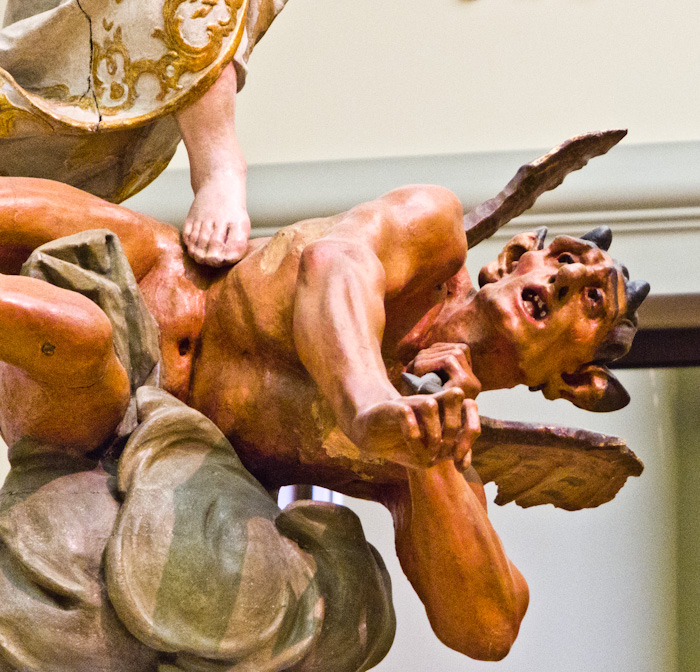
They were washing off the beach in the shower together when a call came from Amy’s school. It was her principal. Amy was in trouble, and she wanted a meeting.
“I’m sorry, but what did she do?” Jack watched the water meter under the showerhead slowly dialled into the red zone as their allotment swirled down the drain.
“She was in a spitting contest,” Mrs. Lindsay said, as though that explained everything. “She left a hole in the flooring, and I expect you to pay for the damage.”
“Mrs. Lindsay, if this is your idea of an end-of-term joke, it’s not funny. My daughter is a humanoid, not a xenomorph.”
“Pardon me? A what, now?”
“Whatever. We’ll be there soon.”
Jack and Charlotte had researched schools all over the city before finally selecting one where Amy might safely make human friends. They chose the one with the smallest classes and the youngest teachers and the best after-school programs. They conducted interviews and obtained references. They wanted her to grow up alongside organic children, to think of herself as a person first and a synthetic second. They showed Amy stories about vN actors, vN chefs, vN teachers and dancers and designers; they avoided news about expanding anti-vagrancy laws and the millions of angry, jobless humans replaced by synthetics. They hoped the world might be a different place for vN by the time she grew up. Things would harmonize, Jack thought, as they entered the schoolyard and made their way to the principal’s office. His daughter would find her place, and she would be happy, and so would her own daughters. They just needed time.
Jack heard himself explaining all of this to Mrs. Lindsay after the door to the principal’s office clicked resolutely shut behind him and Charlotte.
“I understand that, Mr. Peterson,” Mrs. Lindsay said. She was a small Indian woman who wore her black hair in a tight chignon and offset her rather plain suit with ornate enamel earrings in the shape of hummingbirds. “But the reality is that the lifestyle you have chosen for your daughter is having harmful side effects, and not just for school property.”
Jack turned to Charlotte. “How many pancakes did she eat this morning?”
Charlotte shrugged. He was seeing a lot of that shrug, today, and he didn’t like it. “However many her diet said.”
“This is the diet that retards her growth, yes?”
“It doesn’t retard her growth, it gives her time-”
“Mr. Peterson, your daughter is going hungry.”
Mrs. Lindsay laid her hands flat on her desk. Between her fingers, Jack saw a hot map of the school. It randomly leapt between classrooms, offering attendance stats and tiny windows of surveillance footage. Mrs. Lindsay’s gaze slid over to Charlotte, who met it blankly, then back to Jack.
“I’m not certain why I need to explain this to you, but when vN children go hungry, their digestive fluids build up and permeate their saliva. That makes it corrosive, and very dangerous in an environment like this one.”
Jack sat up a little taller in the too-soft chair across from the desk. “I’m well aware of my wife and daughter’s physiology, Mrs. Lindsay. What I don’t get is what gives you the right to tell me how to live in my own home. Amy is a smart, happy kid-”
“No, she isn’t, Mr. Peterson.”
He uncrossed his legs. “Excuse me?”
“Please don’t feel badly about this. Children often hide these kinds of things from their parents. But Amy has no friends in her class. The friends she does have are teachers. She talks with them during the recess and gym periods.”
“Only because you won’t allow her to participate!”
“Accidents happen in those settings all the time, Mr. Peterson. We can’t risk her failsafe going off if a human child falls off the monkey bars and cracks his head open.” Mrs. Lindsay squeezed her eyes shut and took a moment before continuing. “We cannot fulfil your daughter’s special needs and allow the other children to play normally.”
“Then don’t. Keep a closer eye on the organics, and let Amy play. It’s not her fault if one of the monitors can’t stop a fight fast enough.”
“That’s true. It’s not her fault. But it is definitely her problem.” Again, Mrs. Lindsay glanced at Charlotte. When Charlotte said nothing, Mrs. Lindsay raised her hands in a conciliatory manner. “I’m going to recommend that we allow Amy to skip a few grades. Frankly, I was never fully convinced that she should start school in kindergarten. She is not a kindergartener, and has not been one for years.”
Jack looked to Charlotte, expecting back-up without knowing why. His wife had voiced the exact same concerns, back when they made this choice. Now he wondered how much of their choice it had been. Maybe Charlotte was just going along with it, waiting for him to see her brand of reason. He suddenly felt very alone in the room.
“So, what, if we don’t skip her ahead, or grow her bigger, you won’t let her come back next year?”
“Please don’t treat this conversation as a hostage negotiation, Mr. Peterson. This is an inclusive school, and we simply want it to be a safe place for all our students, organic and synthetic.” She steepled her delicate fingers. “But it’s because this school operates from that ethic that I would be forced to report you to certain authorities if I found you unusually defensive about keeping your daughter pre-pubescent in appearance.”
Fear opened up a void inside him. He knew why other men kept their synthetic little girls so little. He wasn’t one of them. But Mrs. Lindsay had the power to make the pedo squad think he was, and that kind of thing didn’t just leave your record even if it was only a simple search for the wrong kind of pornography. It could lose him his next job, and the one after that. He thought of the vagrant vN, their skin bulbous with trash, like medieval plague victims.
Beside him, Charlotte stood. “I think we’ll be taking Amy home, now,” she said. Somehow, Jack stood with her. He wandered toward the door. Behind him, he heard Charlotte ask: “How old were you when you reached your full size?”
“A year,” Mrs. Lindsay said.
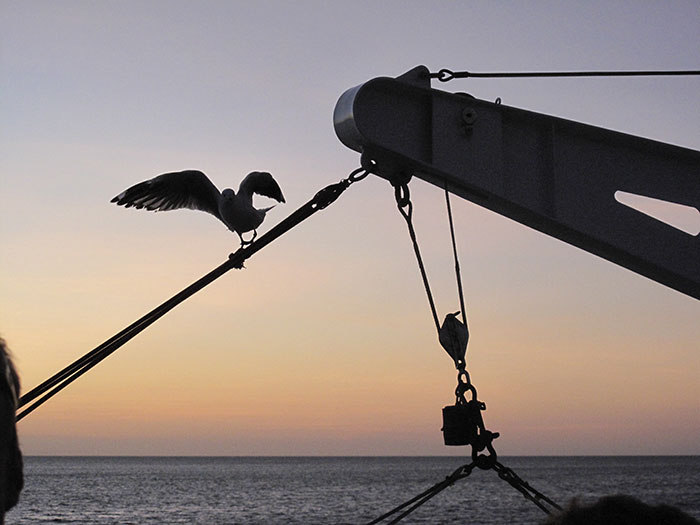
Back at home, they ordered delivery from the nearest Electric Sheep location. Amy wanted to go in and sit down to eat like a grown-up, but after their talk with Mrs. Lindsay Jack had no desire to spend time with the humans ogling the vN waitstaff. The Sheep was a meat market. At least, their local was. Maybe the other franchise locations were different. But the last thing Jack wanted in this moment was for his daughter to watch organic men watching synthetic women. So he put his foot down, and Amy ordered a Folded Hands sandwich with Flexo Fries and an orange LCL punch, and hid in her room playing games until she was done. The meal itself was too big, far beyond her dietary limit, but she said nothing, perhaps having already guessed the things Mrs. Lindsay had told them. Jack wondered, as he munched on his own potato version of the Flexo Fries, whether the principal had counseled her at all before meeting with him and Charlotte. Did they already have some sort of scheme going? Had she asked Amy to report anything unusual?
Jack finished his fries, put his go-box in the sink, and stretched out in his chair. He watched Charlotte watching the limp video display that hung above the fake fireplace. He’d bought the place solely for that fireplace; it was one of the last units in the city to be built with one. In every dream house Amy designed there was now a fireplace, sometimes with a video display over it, but most often with a real brushwork scroll or tapestry or painting instead.
With Amy safe in her room Charlotte had tried lifting the usual limits from the video feed. But even so, an eye-shaped clockwork gear image would eventually pop up, indicating that the programming had triggered the failsafe mechanism. At this point, the device would delay the signal and scan the available feeds until something more suitable was found. Charlotte flicked through her accessible streams with one irritable, jerking finger.
“What’s wrong?” Jack asked.
“Nothing.”
“It’s not nothing. Something’s bothering you. What is it?” He hunched forward and tried to catch her eye. “Is it because you were right, all this time? That we should have grown Amy more quickly?”
Charlotte opened her mouth, then closed it. “No. That’s not it.”
“Then does it have to do with your clade? I know you’ve been tracking them. Do you miss your mother?”
Charlotte leveled him with a glare the likes of which he had never seen in a synthetic woman. It seemed to penetrate his every cell, as though she were watching him decay one picot-second at a time. She was silent for a full minute before whispering: “No.”
Jack swallowed. His wife’s eyes had never seemed so pale, before. They were like jagged pieces of seaglass bleached by the abuse of sun and ocean. Despite the ageless skin surrounding them, they looked terribly old. “We’ve never talked about her, Charlie. Maybe we should.”
His wife shook her head and returned to the feeds. “Nothing about Portia can be solved with conversation.”
“Don’t shut down on me now, I want-”
“Did you intend that pun, Jack? Or was it just a slip?”
Recognizing a no-win scenario when he saw one, Jack stood up and left.
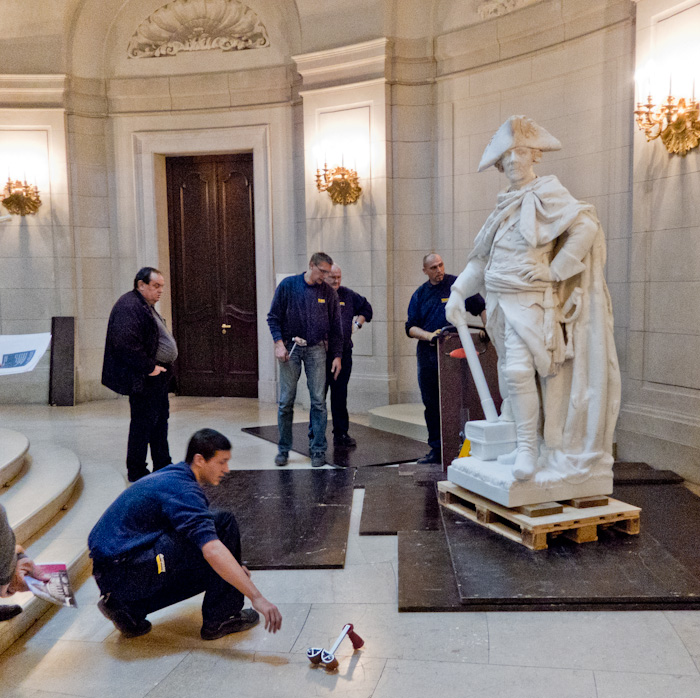
In her room, Jack found Amy captaining a pirate ship and losing. A zombie virus had overtaken her crew, and she, the sole survivor, fired her limited weaponry from the crow’s nest. Her little body swayed with the rocking of the simulated cruiser projected at her feet. She had run out of bullets for her blunderbuss, and now mimed loading the thing with gold doubloons straight from her pocket.
“The gold melts too fast,” she said, “but it leaves a nice big hole.”
Jack poked a finger through one of the miscreants’ sucking chest wounds. The creature cast him an affronted glare. “I thought zombies were weak to salt.”
“They are, but I lost my loyalty round, so my first mate rebelled and bought women instead of supplies.”
“You should have hired a better first mate. Now you’ll have to find another one.”
Amy shook her head. “It’s the ship I mind losing. I worked really hard on this one.”
Jack watched the zombies shambling over his shins. He thought about what Amy’s principal had said. “You don’t mind losing a friend?”
“He isn’t a friend, he’s the game.”
“How can you tell?” Jack let a peg-legged zombie crawl over his hand. An undead parrot alit on his wedding ring and started pecking at it. Bright green feathers the size of rice grains molted away as its head bobbed. They dissipated into smoke in the time it took to blink his eyes. “I’m sure his programming is just as complex as yours.”
Amy rolled her eyes. “Dad, please. I know the difference between adapted and automatic.”
Jack nodded slowly. “Oh.”
Amy made a pincer gesture to freeze the game. “Are you trying to give me a talk about being in trouble? Or about being vN?”
He closed his eyes briefly. “No, I’m not. You’re a person just like anybody else, Amy. You know that.”
“And people get in trouble, sometimes.”
“Yes. People get into trouble, sometimes.”
Amy thawed the game. He watched her fight the zombies as nobly as she could, until they were crawling all over each other to climb the mast and attain her perch. She waited until she could see the pixels of their eyes, and then used an ancient ruby amulet won on her last quest. Jack recognized it from his many trips through her treasure chest. She had played for weeks to find it. The gleaming cabochon inside granted her power over flame. With its projection clutched delicately in her tiny fist, she held it to the in-game sun and watched the light refract red and hot on her enemies. Fire blazed within the stone’s bloody depths. It ran down the red rays and caught and spread among the moaning hordes. They jibbered and screamed and jumped ship. But the damage was already done, and the loss total: the fire had spread to Amy, too, and had run down her sleeve onto the mainsail and mast. The ship was burning. She was going down with it.

“Oh, Charlotte! Hello!”
It was Liz, one of the other mothers. Her son Nate had attended the same daycare as Amy. The boy had nursed a crush on Amy all year and given her a special synthetic chocolate heart last Valentine’s. Now he sat beside Amy in the front row with the gold star students waiting onstage for kindergarten graduation to start, staring at her openly. Amy pretended not to notice.
“It must be so nice to have a boy,” Charlotte was saying. She had brightened since they got in the car. Jack suspected Amy’s unexpected willingness to wear the pretty new graduation dress Charlotte picked out had something to do with it.
Liz laughed. “You didn’t have to potty train him!”
Gary, Liz’ husband, looked Jack up and down. “You think this is it for you, Jack? No more?”
Jack defaulted to his usual answer: “If Charlotte wants another, we’ll have one.”
“Hey, that’s pretty handy. No worries about accidents, right?”
“Gary,” Liz said, in her scandalized voice. She used it on her husband a lot. “Amy is just like other kids.”
Liz was one of those really informed human women with a habit of sometimes sounding like a public service announcement. “Oh, there are Nate’s grandparents.” She gestured toward the door. “Are your parents coming, Jack?”
“My parents won’t be coming,” Jack said. “I’ve pretty much always been a disappointment, if you know what I mean.”
“What, with a pretty lady like this on your arm?” Gary asked. “Come on, what father doesn’t dream of a girl like Charlotte for his son?”
Jack made a mental note never to let Amy play at Nate’s house under Gary’s sole supervision.
“Oh, just ignore him,” Liz said. “We have to go meet my mother, anyway. See you after!”
Together, Jack and Charlotte watched them leave. They sat on folding chairs and sighed in unison, though for Charlotte it was a simple motion of her shoulders. He leaned back and looked up at the vaulted ceiling. It was a good school. He kept telling himself that. It was a good school. Better than most kids got. Better than the insane military shit he’d been subjected to after breaking curfew for the umpteenth time, that was for sure.
“Hey.” Charlotte slipped her cool hand into his. “It’s my turn to ask you. What’s wrong?”
He squeezed her hand. “Just thinking about my dad,” he said. “How stupid he is to be missing stuff like this.”
Charlotte smiled. “The important thing is that we found each other.”
“Damn straight.” He stretched one arm over her shoulders and pulled her closer. “Have I ever told you how smart you are?”
She shrugged. “All that graphene has to be good for something.”
He kissed the top of his wife’s head. He watched his daughter on the stage: her swinging feet, her eager wave. Her bright smile hit him in the gut, as straight and sure as if she had reached over the heads of chattering parents and bored siblings to deliver a finishing blow.
Amy’s teacher, a willowy woman who wore her waist-length hair over a long denim dress, ascended the stage soon after that. She held the microphone with both hands in a white-knuckle grip. She swayed in place as though guided by some internal music. “Welcome to kindergarten graduation,” she said in a thin, high voice. “This has been a very special year for all of us. We’ve learned a lot, and although we’re sad to leave our class behind, we’re excited for next year! On with the show!”
With that, the kindergartners shuffled out of their seats and sang a song complete with hand motions (guided from offstage by their swaying teacher), then herded back to their little chairs (with the name tags affixed to the backs) and fidgeted through a “commencement address” offered by the principal wearing the goofy robes of her alma mater. Then it was time for the diplomas to be handed out.
“Amy Peterson,” the teacher said, and Amy stood. She crossed the stage halfway before pausing and squinting at someone standing among the other parents below the stage.
“Mom?”
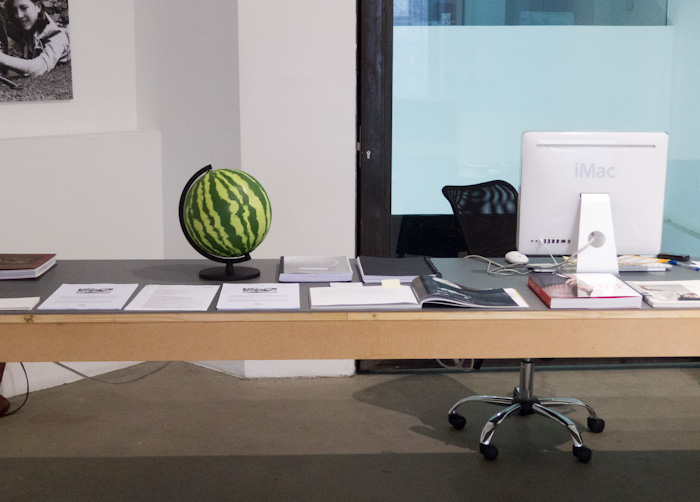
A woman rose slowly to the stage. She wove unsteadily on her feet. Her clothes didn’t quite fit; she’d buttoned her shirt wrong. She wore no shoes. Her skin bristled with unshed plastic. Otherwise, she was Charlotte’s exact replica.
“Come on, Amy.” The vN’s voice had the rough, hollow sound of real hunger. She held her arms out. “Give your granny a hug.”
“Please God, no.” It was the first time in Jack’s memory that he had heard his wife invoke any deity whatsoever.
Onstage, Amy came no closer but did not back away. She spoke clearly and sharply. “I don’t want to hug you. Leave me alone.”
Charlotte’s double lunged, but Nate’s sly five-year-old foot tripped her up. He looked directly at Amy. “Run!”
But Amy didn’t run. She stared as the other vN’s arm shot out across the floor and grabbed the boy’s tiny ankle. He screamed as she yanked him off the chair, off the stage, and threw him like a discus into the crowd. His soft little body hit the linoleum and concrete face-first before skidding down the aisle. Blood smeared from his open mouth and smashed nose. In the gleaming trail, Jack saw a baby tooth. Then it disappeared, swallowed by the tread of a man’s boot. Charlotte’s hand left Jack’s grip as the shrieking started. Her feet pounded down the aisle. She leapt high and crashed down on the stage piano in an explosion of wood and music.
“Amy. Run. Now.”
“Mom-”
“Do it!”
Amy hurried down the stairs. Now Jack ran too, trying to get to her, but he stumbled and fell to the floor. Now he lay eye to eye with Nate, level with the blood oozing from his open mouth with its two front teeth still missing. The boy was dead. Terribly, awfully, horrifically dead, his eyes still open and his hands still sticky with ketchup, a redder red than the deep dark fluid pooled around his ruined face. Jack roared. It was a sound he didn’t know he could produce, something mighty and raw that tore its way up out of his gut and must have signaled his child, because Amy crawled out from the forest of folding chairs to meet him.
“Dad…”
Jack stood up in a flash, pulling her with him and shielding her eyes from the corpse at their feet in case her failsafe – why is that boy dead, how can that boy be dead, why isn’t Charlotte’s mother dead – triggered and caused sudden memory corruption.
Now backing toward the nearest exit with Amy in his arms, Jack watched his wife battling her mother onstage: a blur of twisting limbs and hasty swipes, their arms and legs sweeping the air. Where did she learn to fight like that?
“You can’t have her.” Charlotte grabbed a mic stand. She hefted it across her shoulders. “She’s mine. She’s ours.”
Charlotte’s mother laughed low in her throat. “She can be replaced.”
Charlotte spun, swinging the stand foot-side out. It landed inside her mother’s ribs. The other woman looked at it a moment before snapping it off and gripping the rest of the stand.
“You knew this was coming.” More laughter hiccupped out of her torn body. “You can never outrun me, I’m your mother.”
Charlotte screamed high and desperate. She charged. Her mother grabbed her by the collar and drove her head into the opposite wall. In his arms, Amy had gone perfectly still.
“Dad, Mom needs help.”
He bent her head to his chest, kissed her scalp and stroked her hair. He was at the door, now. He could feel its push-bar in the small of his back, already giving way as he prepared to make the final step. Shame shrank his voice into a rasping thing. “I can’t, baby. I’m not strong enough.”
“Oh.” Amy hugged his neck. “That’s okay.” Then she slipped down his body and ran away.
“Amy, no!”
But Amy, whose ionic musculature was ten times as strong as that of its organic inspiration, was already at the stage. Her little feet danced up the steps. Her voice came out bigger than her little body would have suggested possible: “Granny!”
Charlotte wailed. Amy evaded her frantic grasp and dashed toward the wretched, broken thing before her. She scrambled up it like a monkey on a tree. Charlotte’s mother grinned triumphantly, clasping her arms around Amy’s tiny body, pinning her flailing arms. And as though their reunion were a happy one, Amy darted down for a kiss.
For a moment, it was almost beautiful. Jack thought of his wife and daughter’s kisses, thought of Charlotte’s lips warm and tingling with digestive fluid. You developed a taste for it, after a while. That sweet, distinctive burn remained in the mouth and on the skin for hours. He went to sleep with it every night and rolled over every morning just to get it back. But as Mrs. Lindsay had pointed out, that very pleasure came from the acid bubbling behind their smiles, the kind that only came up if they were obsessive about their diets, if they were trying not to iterate or trying not to grow.
Muffled by her melting lips came the sound of Charlotte’s mother screaming.
Jack had never enjoyed depriving his daughter of food. He firmly believed that for Amy to grow up right she had to grow up slow, and that meant growing up starved. She felt no pain. Her belly didn’t distend. Her nails didn’t weaken or her locks begin to fray. But watching her break the fast of her hungry years he sensed how long they must have felt for her. Her mouth opened wide, wider, until it unhinged like a snake’s and sucked down the remnants of her grandmother’s neck. She snapped a clavicle in her teeth. Black bone dust poured down her throat. Aerogel wreathed her face in a darkly glittering halo. It adhered to her skin in black, sparkling streaks. She licked it off the heels of her hands and spat plastic like a hunter freeing buckshot from fresh-cooked game.
Amy’s grandmother sank to her knees. Amy dug her fingers into the older woman’s skin and pulled. Flesh flensed away from the ribs; aerogel piped out in a smokestack. It coated Amy’s hair and hands and face. The ribcage shuddered and trembled in her grip before finally giving way with a groan. It was not hunger Jack witnessed, now. It was vengeance.
He tried to step forward, to intervene, to be the dad, but there was a tide of frightened people streaming around him and he was, after all, only flesh. He watched as Amy’s body lengthened – her limbs stretching and popping, her shoulders expanding, her waist narrowing, as her grandmother’s body dwindled, faded, became a pile of glittering silicon or lithium or whatever was left. Amy stood, her pretty white graduation dress mere shreds over a woman’s body, and wiped her mouth with the back of her hand.
“All gone, Mom.”
Charlotte covered her face with her hands and slowly crumpled to the floor.
On the floor, Liz keened. She rocked what remained of her son’s body on her lap. Amy hopped offstage and padded down the aisle to the mother and child. Liz scuttled away, whimpering. Ignoring her, Amy knelt beside her dead classmate. She stared at the blood, the broken limbs, the clear evidence of human suffering that should have tripped alarms all through her cognitive systems. Other von Neumanns would be twitching, drooling piles of carbon, by now. In her calm face, Jack saw the collapse of his daughter’s future and the beginning of what he had always dreaded. The failsafe had failed. The world had changed, and his little girl was no longer safe in it.
About the Author
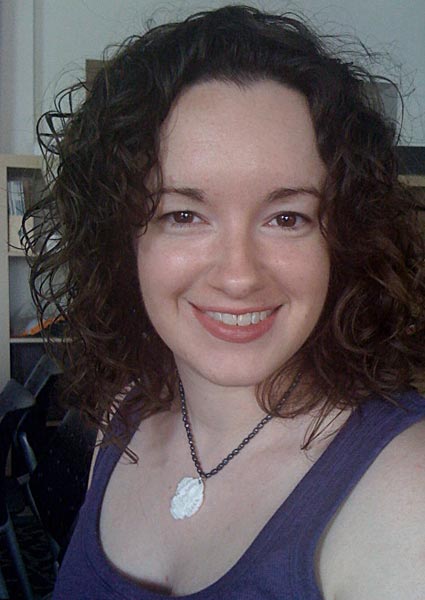
Madeline Ashby is a science fiction writer, futurist-in-training, and anime fan. "Give Granny a Kiss" is the prologue to her first novel, vN, available summer, 2012, from Angry Robot books.
Madeline’s other work has appeared in Nature, Escape Pod, and elsewhere. She blogs for Tor.com is completing her Master’s of Design in Strategic Foresight & Innovation at OCAD University. You can follow her on Twitter as @madelineashby.
Post a comment on this story!